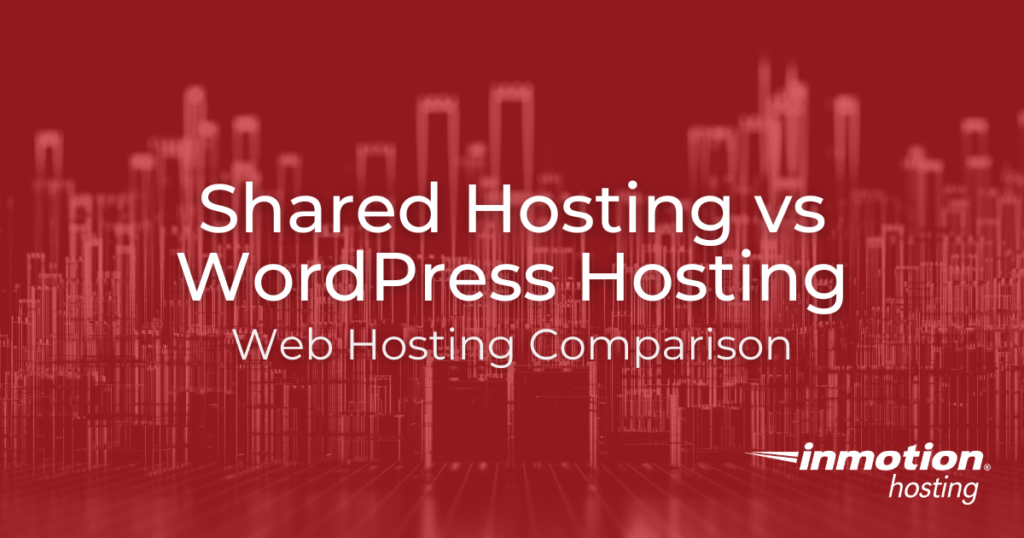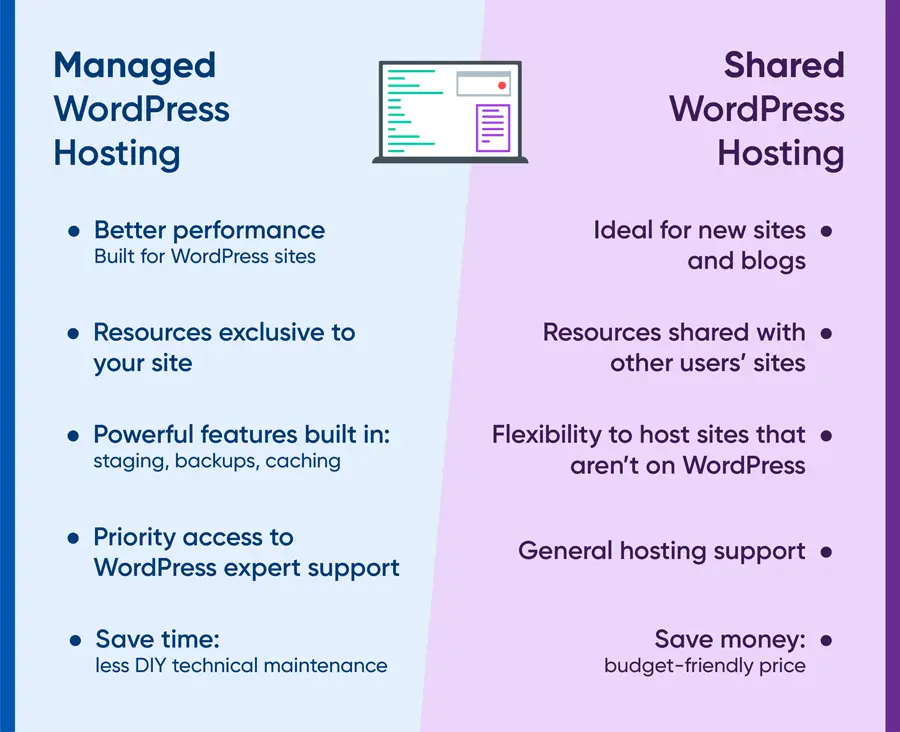If you want to host a website, you may encounter terms like shared hosting and WordPress hosting. Both have benefits and uses.
But what sets them apart? Choosing the right hosting type is crucial for your website’s performance. Shared hosting is a budget-friendly option where multiple websites share the same server resources. On the other hand, WordPress hosting is designed specifically for WordPress sites, offering optimized performance and features tailored to the platform.
Understanding the differences can help you make an informed decision that best suits your website’s needs. In this blog, we will explore the specifics of shared hosting and WordPress hosting, exploring their unique features and benefits, and which might be the best fit for you.

Credit: www.bluehost.com
Introduction To Hosting Types
Shared hosting involves multiple websites sharing a single server’s resources. WordPress hosting is optimized specifically for WordPress sites, offering better performance and security.
Understanding Web Hosting Basics
Web hosting is where your website lives online. It stores all your files and data. Different types of hosting meet different needs, and choosing the right one is important for your website’s success.
Overview Of Shared Hosting
Shared hosting means your website shares a server with others. It is usually cheaper but can be slower. Resources like CPU and RAM are shared among many sites. This can affect performance if a site gets a lot of traffic. It is a good choice for small websites with low traffic.
Overview Of WordPress Hosting
WordPress hosting is optimized specifically for WordPress sites. It often includes features like one-click WordPress installs, which make it easier to set up and manage your site. This type of hosting can also offer better performance and security tailored to WordPress. It is ideal for WordPress users who want simplicity and efficiency.
Key Features Of Shared Hosting
Shared hosting is the most affordable type of hosting. Many websites share the same server, reducing the overall cost. It’s ideal for small businesses or personal blogs. It offers basic features at a low price, making it a great way to start online without spending much money.
Shared hosting is easy to set up—even beginners can do it. Many providers offer one-click installations for popular apps, so advanced technical skills are not needed. Control panels like cPanel make management simple and perfect for new website hosts.
Resources on a shared server are limited. Bandwidth and storage are shared among users, and heavy traffic on one site can slow others. A shared server is suitable for low— to medium-traffic websites but not high-traffic or resource-intensive sites. As the site grows, upgrades might be needed.
Key Features Of WordPress Hosting
WordPress hosting offers optimized servers, enhanced security, and specialized support for WordPress sites. Shared hosting provides general server space for multiple websites but lacks specific WordPress features. This makes WordPress hosting ideal for WordPress users seeking better performance and support.
Optimized Performance For WordPress
WordPress hosting offers optimized performance tailored for WordPress sites. Servers are configured to handle WordPress-specific tasks efficiently, ensuring fast loading times and smooth operation. Dedicated resources are allocated to prevent slowdowns. This setup is perfect for high-traffic WordPress sites.
Enhanced Security Features
WordPress hosting includes enhanced security measures to protect sites. Features like DDoS protection and SSL certificates are standard. Regular security audits and updates ensure vulnerabilities are addressed. Automatic malware scans help keep your site safe from threats. These security features provide site owners peace of mind.
Automatic Updates And Backups
WordPress hosting often includes automatic updates for the core software and plugins. This keeps your site up-to-date with the latest features and security patches. Automatic backups are also included, ensuring your data is safe. In case of data loss, you can quickly restore your site to a previous state. This feature is critical for maintaining site integrity.

Credit: www.inmotionhosting.com
Pricing And Affordability Breakdown
Shared hosting is cheaper than WordPress hosting. WordPress hosting offers better performance and security but costs more. Shared hosting is more budget-friendly for basic websites.
Comparing Costs Of Shared Hosting Vs. WordPress Hosting
Shared hosting is usually cheaper. Plans start at a low price. WordPress hosting often costs more and has extra features for WordPress sites. Shared hosting may be suitable for small blogs, but WordPress hosting is better for larger sites. Both have their own benefits. Choose based on your needs and budget.
Value For Money Analysis
Shared hosting offers basic features and is affordable for many. WordPress hosting provides more value. It includes speed optimization and security, which shared hosting might not have. For a WordPress site, investing in WordPress hosting can be worth it.
Hidden Costs And Upsells
Shared hosting can have hidden costs. Add-ons might increase your bill. WordPress hosting also has upsells. Look for extra services like backups or advanced security. Always check the fine print. Know what you are paying for. Avoid surprises on your bill.
Pros And Cons Of Shared Hosting
Shared hosting is very affordable and ideal for small websites. Users share resources, which lowers costs. Setup is quick and easy. Many providers offer user-friendly control panels. You can manage your site without technical skills, making it an excellent option for beginners.
Shared hosting can be slow during high traffic. Resources are limited since they are shared. Security is weaker compared to other hosting types. You may face downtime if another site on the server has issues. It is less suitable for large websites.
Shared hosting works well for personal blogs, small business websites, portfolio sites, and many non-profits. If your site has low traffic, this is a good choice. However, it is not ideal for e-commerce sites or high-traffic blogs, and large businesses should look for other options.
Pros And Cons Of WordPress Hosting
Shared hosting is cost-effective but may suffer from slower speeds due to resource sharing. WordPress hosting, tailored for WordPress sites, offers better performance and security.
Advantages Of WordPress Hosting
WordPress hosting is optimized for WordPress sites, ensuring fast loading times and high performance. Users get 24/7 expert support. Regular automatic backups keep data safe. Enhanced security features protect websites. The platform is easy to use for beginners.
Disadvantages Of WordPress Hosting
WordPress hosting is usually more expensive. It may lack flexibility for non-WordPress sites. Limited customization options are a drawback. Users could face restrictions on specific plugins. Scalability might be an issue for huge sites.
Real-world Usage Scenarios
This hosting benefits small businesses with WordPress sites. Bloggers enjoy easy management and security. E-commerce sites get fast loading speeds. Developers find it ideal for WordPress projects. Companies needing reliable support choose this hosting.
Specific Recommendations For Ideal Users Or Scenarios
Shared hosting suits small blogs or personal sites with low traffic. WordPress hosting benefits more significant sites needing better speed and security.
Who Should Use Shared Hosting?
Shared hosting is great for beginners. Small websites and blogs can use it. It is cost-effective and easy to manage. It is ideal for users with low-traffic sites. It’s a good starting point.
Who Should Use WordPress Hosting?
WordPress hosting is tailored for WordPress sites and offers optimized performance. It’s best for those needing faster load times and better security. It’s great for business websites and large blogs and requires less technical know-how.
Best Use Cases For Each Hosting Type
Hosting Type | Best Use Cases |
|---|---|
Shared Hosting | Small blogs, personal websites, hobby sites, low-traffic sites |
WordPress Hosting | Business websites, e-commerce sites, large blogs, high-traffic WordPress sites |

Credit: www.dreamhost.com
Frequently Asked Questions
What Is The Difference Between WordPress Hosting And Shared Hosting?
WordPress hosting is optimized for WordPress sites and offers better performance and security. Shared hosting hosts multiple sites on one server.
Can I Use Shared Hosting For WordPress?
Yes, you can use shared hosting for WordPress. It is affordable and suitable for small—to—medium—sized websites. Ensure the hosting provider supports WordPress requirements for optimal performance.
What Is The Difference Between Hosting And WordPress Hosting?
Hosting refers to storing websites on servers. WordPress hosting specifically optimizes servers for WordPress sites.
What Is The Difference Between Hosting And Shared Hosting?
Hosting refers to renting server space for your website. Shared hosting means multiple websites share one server’s resources.
Conclusion
Choosing between shared hosting and WordPress hosting depends on your needs. Shared hosting offers a budget-friendly option for smaller sites, while WordPress hosting provides optimized performance for WordPress websites. Assess your website’s requirements before making a decision. If you seek high performance and reliability, consider Liquid Web Services. Their managed WordPress hosting ensures fast loading times, security, and expert support. Explore Liquid Web Hosting Services for the right solution tailored to your needs.
